So you’ve soundproofed your garage, you’ve fitted garage door seals to seal your garage door and yet every time you open your garage door the huge noise it makes disturbs everyone, from your baby sleeping in the room above to your next-door neighbours.
If this sounds familiar then you would definitely benefit from investing in a quiet garage door opener.
The best quiet garage door openers are:
If you value peace and quiet around the house, a silent garage door does wonders for your sanity, so to help you choose, we’ve rounded up five of the best ones in the market based on our research and experience.
Top Tip: When installing your garage door opener fit it with a garage door silencer which will decouple it from your ceiling helping to further quiet your garage door.
The Best Quiet Garage Door Openers:
The noise a garage door opener makes comes from two sources – the movement mechanism and the motor.
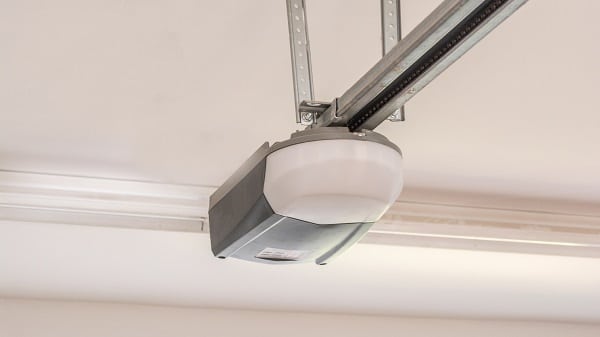
Garage door openers can use a variety of mechanisms which all have different noise levels. The most common type is a chain-driven garage door opener, which tends to be the loudest. Belt driven and torsion driven openers are better, quieter options.
Aside from mechanism, the type of motor used in the door opener can also be a source of noise. AC motors tend to generate more noise than DC. AC introduces a lot of jerky movements that can cause doors to shake and vibrate. DC motors create quieter and smoother motions.
We discuss these factors in more detail later in the article. But first, we’ll run down five of the best quiet garage door openers you can buy:
1. Chamberlain B730 Garage Door Opener
The Chamberlain B730 is a belt-driven garage door opener that’s as silent as you can get.
- Battery backup ensures safe replacement ins and outs even during power failures.Maximum Open Size 7 feet , Actual rail length is 9.4 feet
- Ultra Quiet and Strong Belt Drive Steel reinforced belt drive and constructed with high grade materials for years of reliability and quiet, smooth performance—perfect for attached garages;...
- Powered by Chamberlain’s PLUS Lift Power System, the B730 delivers, the highest lifting force equivalent capacity compared to the 3/4 power class for smooth and reliable performance. Motor Power is...
The B730 uses a belt mechanism made with a proprietary steel-reinforced, high-grade material. It’s designed to be silent, durable, and robust all at the same time.
The B730 garage door opener is so quiet that our baby slept right through it when we installed it in our garage. And by the way, this belt drive needed some lubrication, unlike other belt-driven openers. Lubrication isn’t a big deal, and the fact it needed it assured me that it’s going to operate without a hitch.
When we turned it on, the opening/closing movement was buttery smooth. It’s a bit slower than an old chain-driven opener we used before, but it’s gentler — no sudden yanks or jerks.
So the B730 is a winner in the silence department yet don’t let that trick you into thinking this door opener is a pushover. It’s powered by Chamberlain’s PLUS Lift Power System, making it capable of 3/4 horsepower. It’s enough for most standard garage doors and even those bulky one-piece wooden ones. It features a noise-free DC motor thanks to its anti-vibration technology.
One of its notable features is the use of battery backup. The B730 works even in the event of a power failure. The backup power feature might not seem important now, but you’ll thank yourself for having it when it matters. DC power prevents you or your car from getting locked out.
The drawback of the B730 is that it’s only compatible with Chamberlain components. If you wanted to install a secondary switch for it, you can’t use any other brand. Exclusivity is a minor annoyance, but not a terrible deal breaker.
Overall, the Chamberlain B730 is one of the very best garage door openers in the market. They are ultra-silent operators with superior lifting power and backup power support.
2. Chamberlain B980 Garage Door Opener
The Chamberlain B980 is an upgrade of the B730 with added connectivity and security.
- The B980 security bundle combines all of our top security features. The included automatic garage door lock secures your door every time it closes, so you always know that your home is protected
- Our quiet DC belt drive opener has built in Wi-Fi , for the easiest way to connect the opener, and myq technology, for smartphone monitoring and control
- Eliminates vibrations the home with our quietest DC belt drive opener
Like the B730, the B980 retains that ultra-silent operation. It uses the same belt-drive technology made of steel-reinforced, high-grade plastic material. It’s super durable as well and feels like it can last you years and decades of use.
Again, the opening and closing mechanism operates as quiet as a mouse. It won’t drown out any light conversation in the house. You won’t hear it at all. It’s the reason why it has an app that notifies you if your garage door is open. Otherwise, you won’t have any idea (More on the app later).
The movement is gradual. There are no screeching or clanking sounds that end with a loud bang.
A significant upgrade to the B980 is its lifting power. It uses Chamberlain’s Max Lift Power System with a horsepower rating of 1.25, almost double that of the B730. The motor works well in extreme weather conditions, even in the coldest winter months.
Despite the added power, the motor of the B980 operates rather silently thanks to its anti-vibration technology. It does an excellent job of preventing any sudden jerks from being introduced into the door movement.
The B980 has security features. One of these is the Auto-Lock Deadbolt that automatically engages a deadbolt every time your garage door closes. This extra layer of security works independently of the emergency-release handle. The wireless keypad also has some robust security features built-in like anti-theft and anti-hack.
The B980 is also WiFi-enabled, allowing you to access your garage door using the free MyQ app. With it, you can open and close your garage door wherever you have Internet access. As I mentioned a while back, it also notifies you if your garage door is closed or open, and if so, for how long. This nifty security feature lets you know if your house is compromised even while you’re away.
All in all, the B980 builds upon the already super quiet operation of the B730 with some added bells and whistles. While it comes with a steeper price tag, the added security and connectivity make it worth the added cost.
3. Genie QuietLift Garage Door Opener
The Genie QuietLift is an ultra-quiet garage door opener that’s jam-packed with lots of connectivity features. Despite the bells and whistles, the Genie QuietLift maintains a relatively affordable price point.
- ULTRA-QUIET OPERATION: The Genie QuietLift Connect is an ultra-quiet garage door opener that is ideal for garages attached to living spaces.
- SMART GARAGE SYSTEM COMPATIBLE WITH ALEXA & GOOGLE ASSISTANT: The Integrated Aladdin Connect technology allows you to monitor, open and close your garage door from anywhere with your smartphone. New...
- EASY TO INSTALL: This smart garage features a strong 5-piece rail system snaps together for easy installation. It’s lightweight with no added hardware needed. Plus, pre-programmed remotes are ready...
The heart of the system is a DC motor that has a power of 3/4 HPC. That is comparable to an AC motor with 3/4 horsepower, and it operates in absolute silence. The machine can easily lift any door to a maximum of 7 feet wide.
The DC motor slowl and gently lifts your garage door, while it may be slower than a screw drive operated door it is 10x quieter and smoother, with no sudden shakes or jerks, just a gradual start, and a soft stop. The speed is still pretty reasonable too. The few seconds of extra opening time is way better than having to endure a loud racket.
The Genie QuietLift works on a belt-drive system, which accounts for its noise-free operation. The belt consists of a durable, steel-reinforced, rubber-like material. The result is a garage door opener that makes absolutely no sound.
Using the Genie QuietLift itself is easy and even fun with a whole suite of connectivity options. Of course, you get two Genie 3 button garage door openers for general use. But this garage door opener also offers WiFi compatibility with its Aladdin Connect technology. WiFi allows you to control the QuietLift using your smartphone via the free Genie Aladdin Connect app.
You can open and close your garage from anywhere that you have an Internet connection (handy if you want the delivery man to leave a big parcel in the garage). It also alerts you if your garage door is open, which is a more useful feature than you think.
The great thing about the Genie QuietLift is that compared to the same garage door opener in its class, it costs less. Some doors don’t even have WiFi support at this price range. These factors make it one of the best value-for-money quiet garage door openers you can get.
4. LiftMaster 8500 Garage Door Opener
The LiftMaster 8500 is part of the new wave of jackshaft garage door openers with essential modern and security features. It promises ultra-quiet opening and closing, with minimal vibration. Plus, it all comes in an elegant and compact package.
- Will receive 98022 which replaced 8500w
At its core, the LiftMaster 8500 still uses the same torsion drive technology of its predecessors, albeit better. Your garage door needs to have a torsion bar installed, or else it won’t work. There are also other track systems that the 8500 is not compatible with. Yes, it can be a bit picky, and that is one of its minor drawbacks.
But when it works, it really works. The LiftMaster 8500 features minimal moving parts that might generate noise. Most of the weight of this system sits on the garage door’s shaft, and it’s attached to the wall via a few bolts. Because of this small contact point, minimal vibration transmits through the walls and the rest of the house.
The best way to describe the LiftMaster 8500 opening and closing a garage door is that it glides. It feels like your entire garage door is floating and passing through nothing but air. The opening and closing motion is one of the faster ones we’ve seen in a garage door opener.
The unit’s P3 DC motor also does an excellent job of lifting large, heavy doors without so much as a sound. It’s a heavy lifter, capable of handling large garage doors up to 18 feet wide and 850 pounds. If you have a heavily insulated or one-piece wooden garage door, the LiftMaster 8500 is the one to get.
Security-wise, the LiftMaster 8500 is compatible with their proprietary MyQ technology that allows you to control your garage door with your smartphone. The included remote opener also has Security+ 2.0, which sends a new code every time you click on it. Would-be hackers can’t reuse the code and gain unauthorized entry.
The biggest thing about the LiftMaster 8500 is the steeper price tag. It’s still one of the best and quietest garage door openers money can buy.
5. Decko 24300 Garage Door Opener
The Decko 24300 will surprise you. For one, it uses a chain-driven system, known for being one of the loudest types. It still manages to be ultra-quiet – comparable to that of a good belt-drive.
The Decko 24300’s chain drive performs as advertised – powerful pull with almost zero noise despite being chain driven (which are usually noisy).
This garage door opened and closes pretty smoothly. With no jerking or sudden movements that we’ve come to associate with chain-driven garage doors. The Decko 24300 can detect the weight of your door. It slows down and speeds up to compensate, which leads to gradual soft stops and starts. There’s no loud banging.
The Decko 24300 is designed to handle heavy-duty lifting with its powerful DC motor. It’s rated at an equivalent of 3/4 horsepower, enough for garage doors up to 18 feet wide. Strength makes it very efficient and reliable, with long service life. Noise and vibration from the motor are almost non-existent. Your car’s engine or the garage door will probably make a louder sound.
The auto-reverse system also works pretty well. The unit’s sensors are sensitive enough but in a good way. Even a simple ball roll will trigger the system, which does an excellent job of reacting immediately and rolling back the garage doors.
The only thing that sets the Decko 24300 back a bit is the lack of any modern connectivity features. It’s not WiFi-compatible, nor does it have smartphone support. At its higher price range, WiFi is something other models offer. On the flip side, the 3-button remote and wireless key all work as advertised.
All in all, the Decko 24300 is a serious contender for the best ultra-quiet garage door opener. It has a smooth and quiet operation, with more than enough power for most garage doors. It might not have many bells and whistles, but the basic features are enough to make it an efficient and reliable garage door opener.
Choosing a Garage Door Opener That is Quiet:
When out picking the best garage door opener for you, they’ll likely bombard you with lots of options. Do you go for the chain or belt-driven door? What’s the right horsepower for you? Is a DC motor opener better than AC?
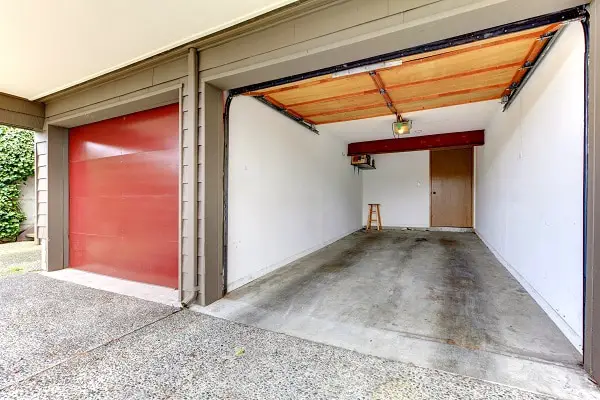
Deciding which to get is easier if you know what you need. Factors to consider include the door’s size and weight, as well as where it is in your house — each of these influences which type of garage door opener to buy.
So with that in mind, let’s go through some of the choices available in the market.
Chain-Driven
Chain-driven is the most common type of garage door opener available and has been in use for many years. As the name suggests, they use a metal chain that’s attached to a trolley that opens and closes your garage door along a track. This chain resembles a bicycle chain but is much more durable.
Chain-driven garage door openers are one of the cheapest you can buy, hence their widespread popularity. They are also one of the most durable, and a well-used chain-driven garage door opener lasts years.
The main drawback, however, is that chain-driven garage doors produce the most noise compared to other types. They tend to introduce a lot of vibration as well, which is particularly annoying if your room is above your garage. The metal-on-metal contact between the chain and the trolley sprocket cause a racket.
Chain-driven garage doors see use in commercial centers or industrial buildings, where noise is less of an issue. Their cost and strength are attractive to such building owners, who tend to use large, heavy-duty garage doors.
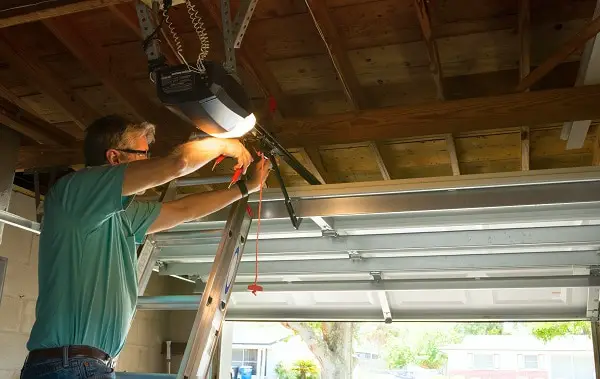
For home use, most owners choose them because of their affordability and durability. However, some more massive door types require a chain-driven opener to operate correctly. These include insulated doors, single-piece wooden doors, or oversized doors. All of these benefit from a chain-drive opener’s added weight capacity.
Also, if your garage stands apart from your home, a chain-drive opener is a fantastic choice because the noise might not be much of an issue.
Belt-Driven
The principle behind a belt-driven garage door opener is similar to that of a chain-driven opener, but with one crucial difference. Instead of using a chain, it utilizes a belt mechanism to drive the movement of the door. The belt itself consists of steel-reinforced rubber, similar to a car tire. The belts are astoundingly durable.
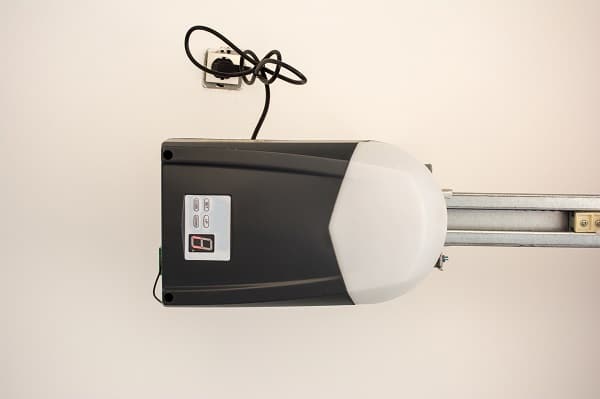
Belt-drive openers are so silent because the rubber belt contacting the trolley’s metallic cog doesn’t make metal-to-metal clanking noises. The idea is like a quiet rubber band when it hits something. Most belt drives also don’t need lubricating, unlike chain drives, to make maintenance easier, if not non-existent.
The rubber belt also operates much smoother than the chain in a chain-driven garage door. It doesn’t introduce any vibrations and swaying as the door runs along the track. The result is that belt-drive doors are less prone to jerky movements, especially when starting up, a common complaint with chain-drive openers. They also open garage doors much faster than chain drives.
Belt-driven garage doors are silent, but they tend to cost a bit more than chain-driven types. Also, belt drives are relatively less durable than their chain counterparts. They’re not capable of handling as much weight, limiting their use to homes with lighter doors.
As such, the best use of belt-driven openers is in homes where the garage is adjacent to other rooms in the house.
Screw-Driven
Screw-driven garage door openers operate on a much different principle than a chain- or belt-drive opener. This type uses a long, threaded-metal rod, pretty much like a giant screw. The screw connects to the opener motor, rotating it to lift the garage door open.
Screw-driven garage doors are some of the strongest in the market. The extra power makes them suitable for a large variety of garage door types. Also, they’re capable of opening and closing doors considerably faster than both chain and belt drives. On average, screw-drive openers can move 12 inches per second compared to the standard of 8 inches.
When it comes to the noise factor, screw-driven garage doors are somewhere in the middle. They’re not as noisy as chain drives, but slightly less silent than belt drives. They also have a smooth operation similar to that of a belt drive.
The silent and fast performance of screw-drive openers is because of fewer moving parts. Fewer parts, in turn, generate much less noise and vibration.
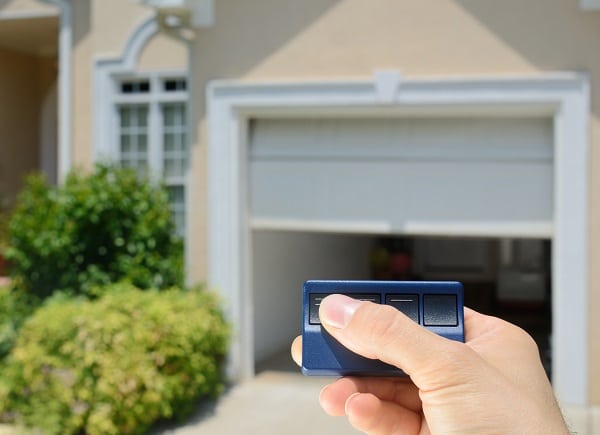
The irony is that screw-driven garage doors require more maintenance than other types. The way it operates makes the threaded rod always grind against the opener’s drive section. This part needs regular lubrication (once every few months), or else the threaded rod will smooth it out.
Screw-drive garage door openers are suitable alternatives for belt-drive openers. They’re perfect if you want faster operation and longer service life, and don’t mind a bit of added noise.
Torsion-Driven
Torsion-driven garage door openers are a newcomer in the market. They are more popularly known as a jackshaft or wall-mount garage door opener. These first saw use with commercial garage doors.
Unlike other openers, these new types attach to the garage wall and feature no overhead parts. They are suitable for non-conventional garage doors with low, blocked or vaulted ceilings. They’re also much more compact and elegant.
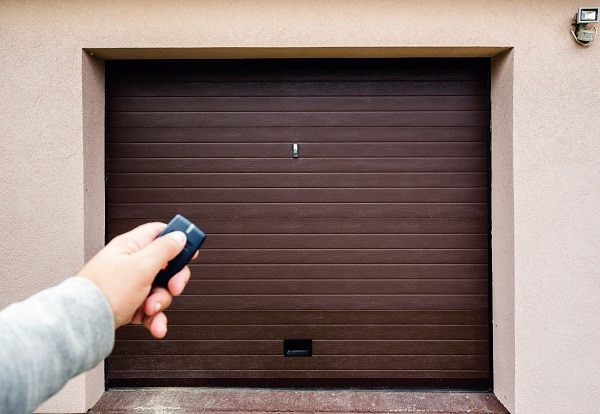
Torsion-driven door openers work with a cable that’s attached directly to the garage door. To move the door the motor uses a series of pulleys and a torsion spring, hence the name. They are one of the most ultra-quiet garage door openers, at par with that of a belt drive. Jackshaft openers technically don’t feature any parts grinding against each other. Instead, they rely on the spring’s tension for movement.
Torsion-driven doors come with a high price tag. Jackshaft garage door openers are generally one of the most expensive in the market. Part of the expense is because they usually have advanced features like an onboard computer and automatic deadbolts.
Experts recommend jackshaft garage door openers if your garage has a higher ceiling than the height of the door. In this case, a torsion-driven opener helps clear most of that ceiling space. You’re now free to use it for other purposes like putting heaters, bikes, and lawn mowing equipment.
Torsion-driven openers are also the right choice for non-garage applications, like adding a security door to your garden shed.
AC or DC Motor?
When choosing a garage door opener, you must also consider the motor that runs it. In particular, you should check whether it features an AC or a DC motor.
AC motors use alternating current (AC) to power their movement. They have been around for far longer than DC motors, being used since the invention of garage door openers. If you have an older door opener, the chances are that it’s using an AC motor.
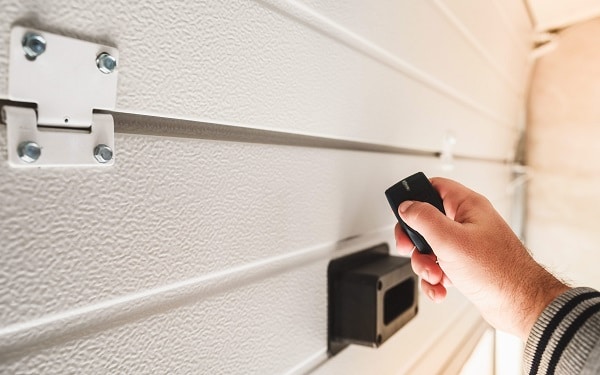
AC motors are more massive and bulkier and require many more components to work correctly. More parts make them generate much more noise. They also jerk noticeably while the door is opening or closing.
Their complexity means AC motors are costly to repair if they break down. Modern components are also incompatible with AC motors. Modern parts usually need DC power to run.
DC motors are smaller, lighter and more compact than their AC counterparts. They are mostly in belt-drive openers. But today more and more garage door openers use them because most advanced features like computer systems can only use DC power.
One of DC’s best advantages is a smooth and quiet operation. Unlike the sudden instant jerk of an AC motor that shakes the door when you open it, DC motor door openers start gradually to give softer stops and starts. The result is in an overall smoother movement that allows you to open your garage door quietly.
DC motors are also capable of storing a small amount of charge through the use of backup battery options. Batteries make them operational even during a power outage, which is quite convenient.
A DC motor’s main drawback is that it’s typically more expensive. Also, AC has a much longer service life. A well-maintained AC motor can last well over 15 years, while a DC motor lasts only seven years or less.
But overall, DC motor is the better buy. It offers better features and advantages over AC.
Horsepower
Aside from the type of motor, the most significant consideration you need to make is horsepower (HP). A horsepower rating tells you how powerful the motor is, which is proportional to how big of a garage door it can handle.
Motors with a higher horsepower can lift heavier and bigger doors. But they also have the added benefit of lasting longer because the engine isn’t as strained with all that extra power.
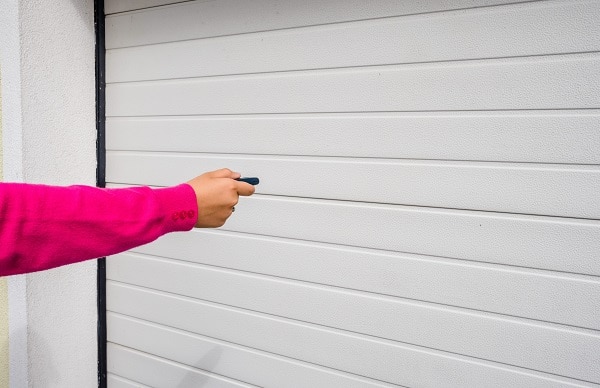
A horsepower of 1/3 is the lowest HP rating for garage door openers. For most single-car garage door types up to 10 feet wide and 8 feet tall, 1/3 HP is more than sufficient. Some double-car garage doors can also be used with 1/3 horsepower motors, as long as they’re not insulated.
Next up in power is the 1/2 HP motor, the standard, most popular horsepower rating. It’s suitable for the majority of garage doors that weigh up to 300 pounds. A half horsepower is capable of handling double-car doors that are up to 16 feet wide. Anything bigger might put a strain on the motor, shortening its life span.
For heavier doors, a 3/4 HP motor is essential. These can lift double-car doors more than 16 feet wide and up to 550 pounds. Heavily insulated double-doors or one-piece wooden doors also require a 3/4 HP power rating. Because of their higher HP, 3/4 motors are more durable and long-lasting than lesser. So they cost more.
For the most heavy-duty uses, consider a 1 HP motor. Their strength and durability make them essential for commercial and industrial grade doors. Large houses with humungous garages may also benefit from 1 HP rating. But for most homes, 1 HP is overkill.
An important thing to note is that horsepower is generally only applicable to AC motors. DC motors don’t measure power in HP. Most DC manufacturers have an equal rating, usually in “HPC” or “Horsepower Similar.” The score tells you the DC motor’s pulling power when compared to an equivalent AC motor. It’s an indication of the actual HP rating of the DC motor.
As an Amazon Associate I may earn a small fee from qualifying purchases at no extra cost to you. This helps us run the site, so thanks for your support!





